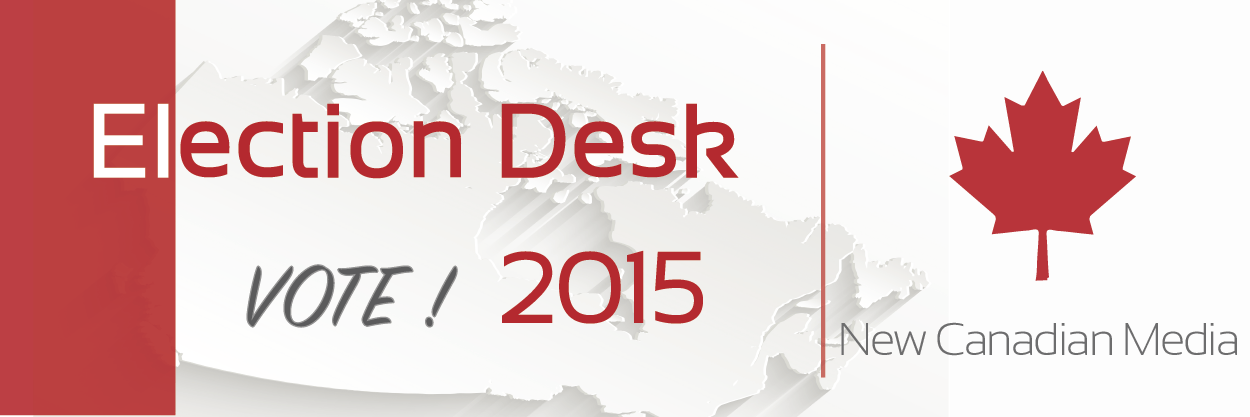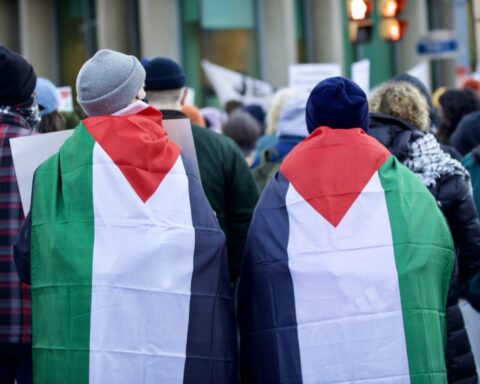
Thursday night’s French language debate in Montreal featured more discussion of immigration and refugee policy than any other leaders debate thus far in the federal election.
The first debate to feature all five leaders was also the first one in which they deliberated the recent court decision to allow women to wear the niqab in citizenship ceremonies.
On Sept. 15, a three-judge panel ruled that the federal government’s ban on wearing niqabs during citizenship ceremonies violates the Citizenship Act.
In Quebec, 93 per cent of respondents were in favour of the requirement that niqabs and burqas be removed during citizenship ceremonies.
However, a public-opinion poll, released on a government website on the day of the debate, found 82 per cent of respondents favoured the requirement that niqabs and burqas be removed during citizenship ceremonies. In Quebec, 93 per cent of respondents were in favour of the policy.
Conservative leader Stephen Harper ordered the poll, which was conducted by Léger Marketing in March.
“If a man cannot impose his will on how a woman dresses, then we should not have a state that decides how a woman dresses,” said Justin Trudeau, leader of the Liberal Party.
He said that the state’s role should be to defend the rights of minorities and women, and that Harper and Bloc Québécois leader Gilles Duceppe were using the issue to play on fears and division.
“This is a question of equality between men and women,” said Duceppe.
Duceppe said he would ban women from wearing the niqab while taking oaths, voting, and administering and receiving public services.
He pointed out that leaders of Quebec’s provincial parties and several mayors support a bill proposed in the National Assembly in June that would ban public-sector employees from wearing clothing that covers their faces.
Duceppe said he would ban women from wearing the niqab while taking oaths, voting, and administering and receiving public services.
“I’m so surprised to see the Bloc Québécois, once so progressive, about to embark into the arena on a matter this divisive,” said NDP leader Thomas Mulcair. He also said Harper was using the court’s decision to distract voters from other issues.
Mulcair added he favours the existing rule, which requires women to unveil and identify themselves before taking the oath.
“Our position for a long time has been that when you join the Canadian family, you should not hide your identity,” replied Harper.
Following the Federal Court’s ruling, Harper said the Conservatives would appeal the decision if re-elected.
Elizabeth May, leader of the Green Party, said the niqab debate was a “false debate” and distraction from issues such as the economy, jobs and climate change.
May also questioned why, in a discussion about women’s rights, there was no mention of an inquiry into missing and murdered Indigenous women.
Refugee crisis debates continue
The leaders were also questioned about the refugee crisis.
“We have already said more refugees, faster, but while still protecting our security and assuring the selection of the most vulnerable refugees for our country,” said Harper. “This is not the time to just open our doors. It’s not responsible.”
Trudeau said Canada should be doing more at the humanitarian level and that his party would like to see 25,000 Syrian refugees come to Canada. He added that during the Vietnam War, Canada accepted 60,000 refugees who made a positive impact in cities like Montreal.
“We could accommodate 10,000 Syrians very quickly, not wait until 2018,” said Duceppe.
Duceppe said the parties should work together with organizations, provinces and municipalities to intervene in Syria and prevent genocide, as was done in Kosovo. He said Muslim women are the main victims in this crisis.
“The system to help refugees does not work. As an MP, I worked with Syrian Canadians. It’s very difficult because there are too many rules.”
“It’s clear that the federal government has not succeeded in their commitment to accept 10,000 refugees,” said May. She added that the federal government achieved its budget surplus by cutting spending to refugee programs.
“The system to help refugees does not work,” she said. “As an MP, I worked with Syrian Canadians. It’s very difficult because there are too many rules.”
Trudeau said the Harper government made cuts to health care for refugees, but Harper rebutted this stating that the only time people were turned down from receiving health care was when they had made false refugee claims. He maintained that Canada’s refugee program is one of the most generous in the world.
Mulcair said his government would accept 9,000 refugees by Christmas and 46,000 in the next few years.
Challenging Harper on Canada-Saudi relations
Mulcair and Duceppe asked Harper why Canada continues to sell weapons to Saudi Arabia while knowing about its human rights violations and support of ISIS. Both party leaders pointed to the case of Raif Badawi, a journalist who was sentenced to 1,000 lashes and 10 years in prison by Saudi Arabia’s Supreme Court for insulting Islam, among other charges.
Badawi’s wife lives in Sherbrooke, QC, where she has appealed to provincial and federal leaders to support freedom of the press and extricate Badawi from prison.
“We’ve indicated we would welcome Mr. Badawi, who is not a Canadian citizen, at any moment,” said Harper. “But it’s not right to punish workers in a factory in London, [Ont.] for this. It doesn’t make sense.”
Leading up to the Oct. 19 election day, there will be a bilingual Munk Debate on foreign policy held Sept. 28 featuring Harper, Mulcair and Trudeau and a second French debate, hosted by TVA, on Oct. 2 featuring Duceppe, Harper, Mulcair and Trudeau.





